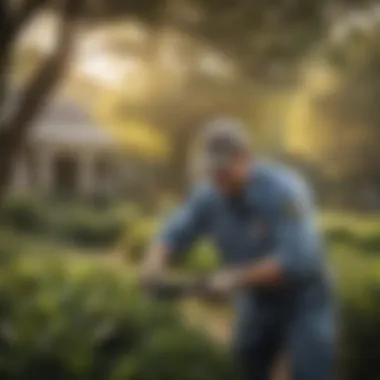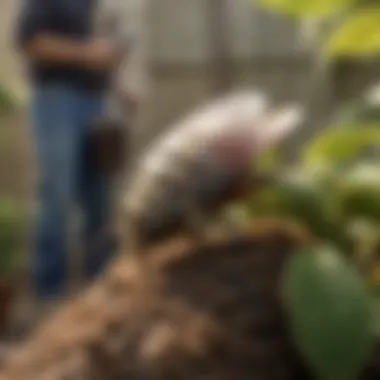Mastering Magnolia Pest Control in Jackson, MS


Intro
Pest control in Magnolia trees situated in Jackson, MS, is of significant concern for homeowners and gardeners. Understanding the specific pests that target these beautiful trees is crucial for proper management. This article aims to provide valuable insights into local pests, effective management strategies, and eco-friendly practices tailored for the region. With awareness and proper techniques, homeowners can ensure the health of their Magnolias while minimizing environmental impact.
Understanding Pests
Definition of Pests
Pests are organisms that can cause damage or harm to plants, including trees like Magnolias. They can be insects, fungi, or bacteria, and each type poses unique challenges. Identifying these pests early is key for effective management and control.
Importance of Pest Identification
Knowing which pests are affecting Magnolias is the first step toward effective control. Proper identification allows homeowners to choose targeted treatments. Misdiagnosis can lead to ineffective solutions, wasting time and resources. For example, the Southern Pine Beetle and aphids often infest Magnolias, but their treatment plans differ. Accurate assessment saves time and promotes healthy growth.
Prevention Techniques
Home and Garden Preventative Measures
Preventing pest infestations starts with maintaining a healthy environment. Here are some key strategies:
- Regularly inspect your trees for signs of pests.
- Keep the area around Magnolias free of debris and dead plant material.
- Encourage beneficial insects that prey on pests, like ladybugs and lacewings.
Implementing these measures is essential for maintaining the health of Magnolias and reducing pest populations.
Seasonal Prevention Tips
Pest activity can vary by season. Understanding these patterns is beneficial.
- Spring: Monitor for aphids as they begin to appear.
- Summer: Check for scale insects and other pests that thrive in warm weather.
- Fall: Prepare for any potential fungal infections due to high humidity and fallen leaves.
Being proactive during these seasonal changes can significantly decrease pest problems in your Magnolias.
Eco-Friendly Pest Control Solutions
Overview of Sustainable Practices
Using sustainable practices is crucial for maintaining ecological balance while managing pests. Avoiding harsh chemicals helps protect beneficial insects and soil health. Here are some sustainable practices to consider:
- Utilize organic fertilizers to strengthen plants and resist pests.
- Implement companion planting to naturally deter common pests.
Such methods nurture the ecosystem while addressing pest concerns effectively.
Natural Remedies and Their Effectiveness
Many natural remedies can be employed against pests. Some effective options include:
- Neem Oil: Disrupts the lifecycle of many pests when sprayed on foliage.
- Insecticidal Soap: Targets soft-bodied insects like aphids without harming beneficial ones.
Using these natural solutions can lead to healthier plants and a more sustainable approach to pest management.
"Ecosystem balance is vital. Protecting beneficial insects can often resolve pest issues without harsh chemicals."
Adopting eco-friendly pest control strategies encourages healthier gardening practices and fosters a more sustainable community in Jackson, MS.
Prolusion to Magnolia Pest Control
Pest control is an essential topic for homeowners in Jackson, MS, particularly those who cultivate Magnolias. These trees are beautiful and provide a lovely aesthetic in any garden, yet they can be quite vulnerable to various pests. Understanding and implementing effective pest control methods is critical for maintaining the health of Magnolias.


Understanding the Importance of Pest Control
Pest control is not just about removing unwanted insects; it’s about protecting the overall health of plants and the environment. For Magnolias, specific pests can cause significant damage if not addressed promptly. Consequently, pest management is vital for several reasons:
- Health of the Plant: Pests such as aphids or spider mites can weaken Magnolia trees by feeding on their sap. This not only reduces the tree's vitality but might also lead to its demise.
- Aesthetic Appeal: A Magnolia in full bloom is a sight to behold. However, pest infestations can cause unsightly blemishes or premature leaf drop, impacting the garden's overall beauty.
- Preventing Spread: Many pests are capable of spreading diseases among plants. Effective pest control helps in averting the possible spread to neighboring flora.
- Cost-Effectiveness: Proactive pest control measures can save money in the long run. By addressing infestations early, homeowners can avoid costly replacements of damaged or dead trees.
Incorporating pest control management into routine maintenance can help gardeners ensure their Magnolias thrive. It aids in recognizing the problem early, mitigating hazards, and sustaining a healthy, eco-friendly garden.
Common Pests in Jackson, MS
Understanding common pests in Jackson, Mississippi is crucial for effective pest management. The region's unique climate and vegetation create an environment conducive to various pests. These pests can damage interiors, landscapes, and health. Identifying them helps homeowners take proactive steps to control infestations.
Insect Identification
Proper insect identification is the first step in pest management. Different pests require specific strategies for effective control. Recognizing pests by visual characteristics helps in timely interventions. For example, distinguishing between harmful insects, like termites, and beneficial ones, can lead to better gardening practices.
Common Household Pests
Cockroaches
Cockroaches are a significant concern in many households in Jackson. These insects are known for their resilience and adaptability. One key characteristic of cockroaches is their rapid reproduction rate. This makes them a prevalent choice for focus in pest control discussions.
Cockroaches are often associated with unsanitary conditions. They can carry diseases and allergens. Their ability to hide in small crevices makes them hard to spot. Effective control methods include sanitation, sealing entry points, and using bait traps.
Ants
Ants are another common household pest. They are social insects and typically live in colonies. One major aspect of ants is their foraging behavior. This characteristic allows them to become a nuisance when searching for food.
Ants can invade homes, kitchens, and gardens. They can also indicate underlying issues with food storage. The presence of ants highlights the need for good sanitation practices. Targeted bait and barrier strategies can effectively manage ant populations.
Termites
Termites pose a severe risk to structures. Their ability to feed on wood and cellulose means they can compromise the integrity of buildings. Their key characteristic is their destructive behavior over time. This makes them a critical focus within pest control discussions.
Timely detection is essential, as they can go undetected for long periods. Signs include mud tubes and damaged wood. Treatment options may include bait systems or liquid treatments. Homeowners should regularly check for signs of termites to mitigate risk.
Garden Pests
Aphids
Aphids are notable garden pests in Jackson. They feed by piercing plant tissue and extracting sap. This can weaken plants and introduce diseases. A unique feature of aphids is their reproduction method; they can reproduce asexually under favorable conditions. This can lead to rapid population growth. Managing aphids often involves introducing natural predators like ladybugs or using insecticidal soap.
Spider Mites
Spider mites are tiny but can cause severe damage to plants. They thrive in hot, dry conditions. Their key characteristic includes forming fine webs on plants. This can signal their presence quickly. Spider mites can stress plants and cause leaf discoloration. Management involves maintaining humidity and employing miticides as a last resort.
Whiteflies
Whiteflies are also a concern in gardens. They insert their mouthparts into plant tissue, extracting sap. This can cause leaves to yellow and drop. One key feature of whiteflies is their tendency to reproduce rapidly, similar to aphids. Effective control measures include ensuring good air circulation around plants and introducing predatory insects. Regular monitoring is key to managing whiteflies effectively.
Pest Management Strategies
Pest management strategies are essential components to maintaining the health of magnolia trees and the surrounding environment in Jackson, MS. With numerous pests posing threats to these trees, effective management becomes crucial. Understanding diverse methods allows homeowners to not only protect their plants but also to ensure the ecosystem remains balanced. Successful pest management includes knowing the types of pests present, selecting appropriate control methods, and implementing preventive techniques.
Integrated Pest Management (IPM)
Integrated Pest Management is a holistic approach to controlling pests that focuses on sustainable practices. This strategy is becoming favored among gardeners and homeowners. The essence of IPM lies in utilizing a combination of techniques rather than relying on a single method. This diversity reduces the risk of resistance development among pests while promoting environmental safety.
Principles of IPM


The core principle of IPM involves careful monitoring and identification of pests before deciding on treatment measures. This strategy includes observing the pest life cycles, understanding population dynamics, and determining acceptable pest thresholds. By doing so, unnecessary pesticide application is minimized. One key characteristic of IPM is its reliance on natural pest controls, such as beneficial insects and plant health, which creates a balanced ecosystem. IPM is beneficial since it incorporates cultural, physical, and biological control methods to achieve its goals. This multifaceted approach limits environmental impact.
Benefits of IPM
The primary benefits of IPM include reduced chemical usage and increased pest control effectiveness. It promotes a healthier environment by emphasizing non-toxic methods of pest control. One key characteristic that makes IPM popular is its adaptability; it can be used across various environments. The unique feature of IPM is its emphasis on prevention, which not only addresses current pest issues but also prevents future infestations. This long-term approach generally leads to lower costs and better overall plant health, making it a sustainable choice for homeowners.
Chemical Solutions
Chemical solutions, while often effective, require careful consideration. Different pesticides target specific pests and vary in application methods, necessary protective measures, and impact on beneficial organisms. Homeowners in Jackson, MS, need to be aware of the risks associated with chemical use. Choosing the right chemical involves understanding product labels and employing them judiciously. It is advisable to use pesticides as a last resort after exploring other management strategies.
Natural Remedies
Natural remedies are gaining popularity for those looking to avoid chemicals. These methods are typically more environmentally friendly and safer for homeowners and pets. They can be effective in managing common pests while maintaining ecosystem health.
Essential Oils
Essential oils offer a natural alternative for pest control. Oils like peppermint and lavender can deter pests due to their strong scents. One key characteristic of essential oils is their ease of application; they can be diluted and sprayed directly onto affected areas. However, the effectiveness of essential oils can vary based on concentration and formulation. Homeowners may need to reapply frequently, particularly after rainfall. Essential oils present a beneficial approach, especially for those seeking holistic solutions.
Diatomaceous Earth
Diatomaceous Earth is a natural substance ideal for pest management. It consists of tiny fossilized aquatic organisms and can control insects by dehydrating them upon contact. One key characteristic is its versatility; it can be used both indoors and outdoors. Diatomaceous Earth is a popular choice because it presents minimal risk to humans and pets when used correctly. However, users must ensure they take care during application, as inhalation of the powder can be harmful. Its advantages lie in being a long-lasting method of pest control that is easy to apply.
The importance of pest management strategies cannot be overstated. By employing a range of techniques, homeowners can protect their magnolia trees while maintaining ecological balance.
Preventive Measures
Preventive measures are essential in maintaining the health and vitality of magnolia trees and minimizing pest issues in Jackson, MS. A proactive attitude can greatly reduce the chances of infestations and the damage they can cause. Effective prevention involves understanding the local ecosystem, the specific needs of magnolia trees, and the behavior of common pests within the region. Additionally, preventive practices emphasize the importance of regular maintenance and monitoring, which contribute to a healthier environment for both plants and beneficial organisms.
Home Maintenance Tips
Maintaining your home can significantly influence pest control. By fostering an environment that is less inviting to pests, homeowners can see a marked decrease in their population. Here are some effective home maintenance tips:
- Seal Entry Points: Regularly inspect and seal cracks around windows, doors, and foundations. Pests often find their way indoors through the tiniest openings.
- Proper Waste Disposal: Always store trash in sealed bins and clean areas where debris accumulates. This practice limits food sources for pests.
- Indoor Cleanliness: Keep living spaces clean and organized. Regular vacuuming and dusting can help remove pest hiding places and food particles.
- Regular Inspections: Periodically check for signs of infestations. Early detection is crucial in managing pest populations before they escalate.
These steps create barriers for pests and reinforce a culture of cleanliness around the home, which is vital in pest management.
Gardening Techniques to Deter Pests
The garden around magnolia trees can attract various pests. Implementing specific gardening techniques enhances plant health and reduces pest-related issues. Here are several effective practices:
- Companion Planting: Certain plants, such as marigolds and basil, can naturally repel pests. These should be planted alongside magnolias to create a protective barrier.
- Mulching: Applying a layer of organic mulch can help maintain soil moisture and deter weeds, which often host pests.
- Regular Pruning: Trim dead or diseased branches. This action improves air circulation and reduces the habitat for pests.
- Soil Health: Ensure proper soil pH and nutrient levels through testing and amendments. Healthy soil promotes stronger plants that can resist pest pressure more effectively.
These gardening practices, while requiring some effort, can greatly diminish pest attraction, thus contributing to a robust and thriving garden environment.
Effective preventive measures not only protect magnolias but also support a sustainable ecosystem, minimizing the need for drastic chemical treatments.
Local Regulations and Eco-Friendly Practices
In Jackson, MS, effective pest control is not only a matter of personal choice, but it is also influenced by local laws and regulations. Understanding these rules can aid residents in maintaining a balanced relationship with the environment while effectively managing pest issues. The goal is to promote sustainability while adhering to government standards. Local governments often establish regulations to reduce environmental impact and safeguard public health.
Understanding Local Laws on Pest Control
Understanding local laws is essential for homeowners engaging in pest control activities. In Jackson, various regulations aim to manage the use of pesticides and other treatments. It is imperative for homeowners to be familiar with these rules to avoid potential fines and ensure that they are practicing safe pest control. Some important aspects to consider include:
- Pesticide Restrictions: Specific types of pesticides may be regulated or banned due to their harmful effects on the local ecosystem. Homeowners should refer to local guidelines or the Mississippi Department of Agriculture and Commerce to stay compliant.
- Notification Requirements: Certain pest treatments, especially those using chemicals, may require neighbors to be notified ahead of time. This protects the health of all residents in the vicinity.
It is wise to consult local authorities to ascertain specific guidelines, ensuring that your methods of pest control are both effective and lawful.


Sustainable Pest Control Approaches
Adopting sustainable pest control methods not only protects the environment but also promotes the health of residents and their families. Here, we will explore two significant approaches: Organic Solutions and Encouraging Beneficial Insects.
Organic Solutions
Organic solutions are becoming increasingly popular due to their minimal impact on the environment. This type of pest control uses natural substances rather than synthetic chemicals. Some important aspects are:
- Key Characteristic: Their use of natural ingredients such as plant extracts, essential oils, and biological controls.
- Benefits: These solutions tend to be safer for humans and pets. They reduce the risk of pesticide exposure while also promoting a healthier ecosystem.
- Unique Feature: Organic solutions are often biodegradable, meaning they break down naturally and do not linger in the environment. This leads to a reduced likelihood of long-term ecological damage.
Despite their numerous benefits, organic solutions may not be as immediately effective as synthetic options, requiring homeowners to be patient while they work.
Encouraging Beneficial Insects
Encouraging beneficial insects is another sustainable practice in pest management, and it serves as a natural way to control pest populations. Here are key points:
- Key Characteristic: The practice focuses on attracting and maintaining populations of insects that naturally prey on harmful pests.
- Benefits: This approach minimizes the need for chemical pesticides by creating a balanced ecosystem. Beneficial insects, such as ladybugs and lacewings, help keep pest populations in check.
- Unique Feature: Cultivating a garden that attracts these insects involves using companion planting and avoiding harmful treatments. This fosters a healthy habitat for the beneficial species without compromising safety.
While attracting beneficial insects can take time and commitment, the long-term payoff is significant, leading to less reliance on chemical controls and a more sustainable approach overall.
Remember: Being aware of local regulations and incorporating eco-friendly practices into pest management can lead to a thriving environment for both residents and the ecosystem.
Technology in Pest Control
Technology plays a crucial role in modern pest control. It transforms how homeowners and businesses manage pests, ensuring both effectiveness and efficiency. In Jackson, MS, where pest issues can vary due to climate and local flora, advanced technological solutions can address specific challenges. By integrating technology into pest management, significant benefits can be achieved, including improved monitoring, quicker response times, and tailored treatment plans. Moreover, with the rise of eco-conscious practices, technology also facilitates sustainable approaches to pest management, aligning with the growing demand for environmentally friendly solutions.
Advancements in Pest Management Technology
Recent years witnessed significant developments in pest management technology. One of the most notable advancements is the use of drones for aerial surveys. These drones can quickly assess large areas, identifying pest infestations before they escalate. This can be especially useful for large gardens or commercial landscapes.
Furthermore, thermal imaging cameras are becoming popular. They help detect hidden pest activity, especially for termites and rodents, by identifying temperature differences in structures. This proactive method allows homeowners to address pest issues early on, preventing further damage.
Another advancement is the integration of artificial intelligence (AI) in pest monitoring systems. These smart systems analyze data to predict pest behavior, enabling preemptive measures. Automated pest traps and monitoring stations are equipped with sensors that notify owners of pest activity, reducing unnecessary pesticide use and targeted interventions.
"The integration of advanced technology in pest control has led to more effective and sustainable solutions, ensuring pests are managed with minimal impact on the environment."
Using Smart Devices for Pest Control
Smart devices have become integral in pest management for homeowners in Jackson. These technologies simplify monitoring and intervention processes. For example, smart traps can send alerts when a pest is caught, allowing for timely disposal and reducing the likelihood of future infestations.
Moreover, smart irrigation systems can be optimized to reduce excess moisture, a common draw for pests. By incorporating soil moisture sensors, homeowners can ensure that they are watering plants without creating a hospitable environment for unwanted pests.
Apps designed for pest identification also contribute to the smart management of pest issues. Users can take pictures of pests on their property, and the apps use machine learning algorithms to identify the species and suggest proper management techniques. This immediacy of information empowers homeowners to make informed decisions quickly.
Closure
In the realm of pest control for magnolias in Jackson, MS, understanding the specific challenges and opportunities is paramount. Effective pest management encompasses a range of strategies and practices that help in maintaining not just the health of the magnolia trees but also the overall ecosystem. By being proactive, homeowners can significantly reduce damage caused by pests before they become an uncontrollable problem.
The importance of a pest-free environment cannot be overstated. It promotes not just the growth of the magnolia plants but also enhances the beauty and value of the property. Engaging in regular monitoring and implementing an Integrated Pest Management (IPM) approach allows homeowners to use targeted methods that minimize chemical use while promoting a balanced environment.
When integrating eco-friendly practices and local regulations into pest control strategies, it's necessary to consider the local ecological balance. Encouraging beneficial insects can naturally suppress pest populations, contributing to a more sustainable approach. Furthermore, understanding how technology, such as smart devices, can streamline pest monitoring and management helps in making informed decisions on treatment methods.
Ultimately, successful pest control involves a commitment to ongoing education and adherence to best practices. Homeowners should remain vigilant and adaptable, as pest threats evolve. By fostering a comprehensive understanding of pests and employing appropriate strategies, achieving a pest-free environment becomes a realistic and rewarding goal.
Final Thoughts on a Pest-Free Environment
Maintaining a pest-free environment is not simply about addressing immediate issues; it is about creating sustainable conditions for long-term health. Homeowners should continuously educate themselves about local pests and emerging control techniques.
- Regular inspection and maintenance of homes and gardens is crucial.
- Implement preventive measures like sealing entry points and proper waste management.
- Promote biodiversity in gardens by planting native species that attract beneficial insects.
Through gradual and informed actions, a pleasing and pest-resistant landscape can thrive. Ultimately, your efforts will enhance not only the beauty of your magnolias but also the overall health of your surroundings.
"An integrated approach to pest management not only protects your garden but also sustains the natural ecosystem."
Embrace the challenges of pest control with knowledge and responsibility, and you will see the fruits of your labor reflected in the vigor of your magnolias.



